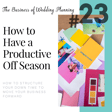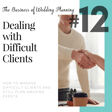Become a Creator today!Start creating today - Share your story with the world!
Start for free
00:00:00
00:00:01

Setting Boundaries with Clients & Vendors
1. Understanding the Importance of Boundaries
- Discussion on how setting boundaries helps establish professional relationships, prevents overcommitment and burnout, manages time and resources effectively, and ensures the delivery of the best possible service.
2. Setting Boundaries with Clients
- Clear Communication from the Start: Amber talks about the importance of starting relationships with clear communication, detailing working hours, response times, and service expectations.
- Manage Expectations: Strategies for being clear about what services include and how to handle requests that are beyond the scope.
- Communication Protocol: Setting specific times for meetings and calls, and the use of efficient tools like emails or project management software to keep communications well-documented and efficient.
- Firm yet Respectful: How to deal with clients who repeatedly cross boundaries, emphasizing the importance of being firm but respectful.
3. Setting Boundaries with Vendors
- Clear Agreements and Contracts: Importance of having documented contracts with vendors that detail delivery times, payment terms, and the scope of work.
- Timely Communication: How to communicate needs and expectations clearly and in advance to maintain good relationships and avoid last-minute stresses.
- Respect Their Expertise: Amber discusses the value of respecting vendors’ expertise while ensuring the client's vision is communicated effectively.
- Professional Conflict Resolution: Strategies for addressing conflicts professionally by focusing on solutions rather than blame.
4. General Tips for Setting Boundaries
- Be Consistent: Amber advises on applying rules consistently across all clients and vendors to establish a reputation as a fair and professional planner.
- Stay Organized: Tips on using tools and software to manage tasks and communications efficiently.
- Know Your Limits: Importance of understanding personal capabilities and the danger of overcommitment.
- Self-Care: Emphasis on the importance of planners taking time for rest and personal life.
Transcript
Introduction to the Podcast
00:00:02
Speaker
Are you a wedding planner just starting your business or have you been in the industry for just a few years? Do you want to build a profitable and enjoyable planning business that you're excited about every day? If the answer is yes, then you're in the right place. Welcome to the business of wedding planning podcast. I'm your host, Amber Peterson. I was a wedding planner for 10 years, a marketing strategist for service-based businesses, and now the owner of Planner's Lounge. I know what it's like to work so hard as a planner but not see the growth and profit you dream of. I also know that while you can be the most talented planner in your market, if you don't have the business foundation, it will be hard to continue growing.
00:00:45
Speaker
I have seen so many talented planners burn out because they become frustrated with things unrelated to wedding planning, like finances, marketing, team growth, and operations.
Mission and Support for Wedding Planners
00:00:56
Speaker
This is where the Business of Wedding Planning podcast and Planners Lounge come in. Our mission is to help you learn what it takes to build the business of your dreams with simple digital product solutions, educational content, and the support of our free community, the Very Important Planners Lounge, or VIP Lounge for short. I understand what it's like to work in this unique industry while having a lot on your plate. During my time as a planner, I had three daughters, bought and moved to two new homes, and launched two other businesses. I am excited to combine my education, industry experience, and passion to help you reach your business goals.
Importance of Setting Boundaries
00:01:37
Speaker
Hi friends, welcome back to the Business of Wedding Planning podcast. Today, we're discussing an important topic for every wedding planner, and that is setting boundaries with clients and vendors. As wedding planners, we orchestrate days that are seamless and memorable, but to do that effectively, we need to manage logistics, our relationships, and the expectations of our clients and vendors. So setting clear boundaries is essential for maintaining professionalism, reducing stress, and ensuring the quality of our services. Let's start by understanding the importance of boundaries.
00:02:15
Speaker
Boundaries in wedding planning are key for several reasons. They help establish professional relationships, they prevent over-commitment and burnout, and they help manage our time and resources effectively. And finally, they enable us to deliver the best possible service without spreading ourselves too thin. Setting boundaries with clients actually helps build better relationships. The relationships we have with our clients is the cornerstone of our businesses. And even though we often become friends with our clients, there needs to be boundaries to maintain the client service provider relationships during the planning process. Here's some ways to set effective boundaries. First, clear communication from the start. Initiate open and honest communication from the very first meeting.
00:03:07
Speaker
This means explaining your working hours, your response times, and what they can expect from you and from your services. Make sure these details are included in your contracts to avoid any misunderstandings. Second, manage their expectations. Be clear about your services and what it is and what is included and what's outside of your scope. If a request is beyond what you offer, explain this politely and provide alternatives when possible. If it is something that you can do, make sure that you are charging appropriately for that. I know that when I was planning, especially in the beginning, people would want to add something on and I'd say, sure, I can do that, but I wasn't charging for it. If you are going outside the scope of your contract, a great way to communicate that is say, I would be happy to do that for you. Would you like me to send over an amended contract or an invoice for that additional service?
Communication and Documentation Strategies
00:04:06
Speaker
The third thing you want to do is establish a communication protocol. Set specific times for meetings and calls and encourage using emails or a project management tool for non-urgent communication. This keeps all of your communication efficient and well-documented. You don't want to have different things in different modes of communication. For example, if you're texting and calling and emailing and messaging on social media, you need to make sure that you have clear documentation. So if anything does go sideways, you can refer back to what was said, what was communicated, what was decided.
00:04:47
Speaker
If you do end up having communication in lots of different places, one thing you can do is to consolidate that by doing something that I used to do all the time. So for example, if we had a phone call. I would then, when I ended that call, say, I'm going to put this on to an email and send it over just to make sure that we're on the same page and ask them to respond saying that it all looked good. That way, if anything ever came up that I had to refer back to a decision that was made or a direction that was given by my clients, I could go back to my email.
00:05:23
Speaker
I personally like to have everything in email just because it was easy to search my inbox for phrases, words, things like that. um But it is important to have everything well-documented.
Handling Boundary Violations and Professionalism
00:05:36
Speaker
And finally, be firm yet respectful. If a client repeatedly crosses your boundaries, address the issue firmly but kindly and remind them of the agreed terms and the importance of adhering to them in order to have a successful event. So that's setting boundaries with clients. What about the vendors? Good relationships with vendors is just as crucial for a smooth event, if not more so since you probably are going to be working with them time and time again.
00:06:06
Speaker
It's important to maintain professionalism because of those repeated relationships. Here's how you can establish effective boundaries with fellow wedding vendors. Make sure you have clear agreements and contracts. When you are reviewing your client's agreements or signed contracts with vendors, make sure that they're documented well and that all of the question marks are addressed. So this includes delivery times, payment terms, scope of work. You want to have a clear understanding of that so that you can advocate on behalf of your clients or help them if they have questions about it. Make sure that you are communicating in a timely manner.
00:06:50
Speaker
communicate your needs and expectations clearly in advance to avoid straining your relationships with last-minute requests. And also, it is just good business to be a planner who responds quickly. We've all been in the situation where we're reaching out to our couples hired vendors and some of them are not getting back to us. And it is so frustrating because we normally have a lot of questions or we're trying to finalize details. Lead by example here, always be someone that communicates quickly and let them know when you do speak to them, here's my how I work, here's my process, this is the information I need from you, and don't be afraid to follow up. Number three, respect their expertise. It's important to communicate your client's vision, but also respect the expertise and experience of their hired vendors.
00:07:48
Speaker
Collaborative relationships yield much better results than you dictating to them. And if your clients hired them, there's a reason. They like something about that vendor, and so you need to trust that there they have been brought onto the vendor team for a reason. And finally, be professional in any conflict resolution. If conflict arises, address it professionally and focus on finding solutions rather than assigning blame. And if something happens at a wedding with a vendor, I would highly recommend that you are not talking about that with other vendors.
00:08:29
Speaker
just because wedding, local wedding markets are so small and word travels fast. It is never going to be a good idea to be gossiping or, you know, talking about what a vendor did or did not do because it will get back to them and then it will come back to you. Obviously, if you have your trusted people that you vent to, that's one thing, but I would in no way spend any time just chatting about a grievance you have with a vendor to other random vendors. It's just never a good idea.
Maintaining Personal Well-being and Consistency
00:09:06
Speaker
Let's go over some general tips for setting boundaries. Be consistent with your boundaries ah across the board. Apply the rules consistently to all clients and vendors. This helps establish your reputation as a fair and professional planner.
00:09:21
Speaker
With clients and vendors, there are going to be some that you become friendly with. And when that happens, it can be very easy to bend your boundaries or your policies to accommodate them because you like them. They're your friends. But again, small markets, small industry groups, just keep things consistent across the board. meet for dinner, meet for drinks, but when it comes to your professional working relationship, keep those boundaries and policies consistent. Next, stay organized. Use tools and software to manage your tasks and communicate efficiently with your clients and your vendors.
00:10:00
Speaker
This is just going to make you that much more professional and make sure nothing falls through the cracks. Third, know your limits, understand your capabilities, and do not overcommit. It's better to deliver exceptional service to fewer clients than to stretch yourself too thin and just give mediocre service or develop a reputation in your market for kind of just not doing the greatest job. It's great to be busy, but it's not great if it impacts your level of work you're delivering. And finally, and this is something that comes up a lot, make sure you're taking time for self care. Your wellbeing is important and make sure to allocate time for rest and your personal life so that you can show up for your clients and your vendor partners in the best way possible.
00:10:52
Speaker
Setting boundaries is and not about creating barriers. It's about building a framework with which you can work effectively and maintain healthy professional relationships. If you're a new or aspiring wedding planner, mastering the skill is as important as any logistical or creative aspect to the job.
Conclusion and Preview of Next Episode
00:11:10
Speaker
Thank you so much for tuning in to today's episode on setting boundaries. I know it was a quick one, but it's an important topic. it And if you want to talk more about it, I invite you to join us in the VIP lounge. Join us next time as we continue to explore important skills for wedding planners. And next episode, we're actually going to have a guest talking about submitting your weddings to publications. Until then, take care of yourself and make sure to set those boundaries. Have a great week.



















